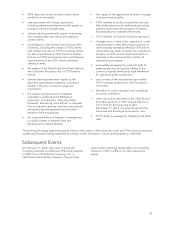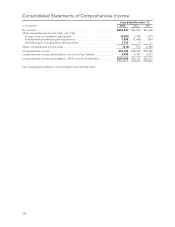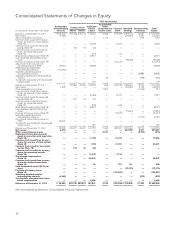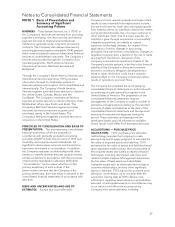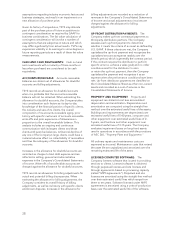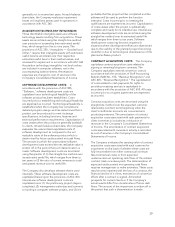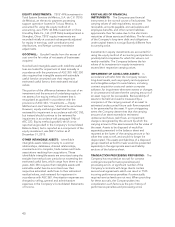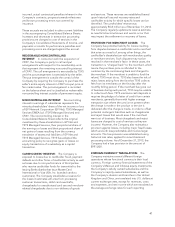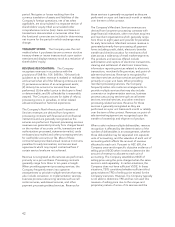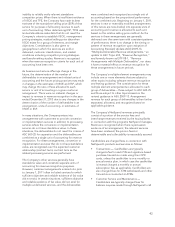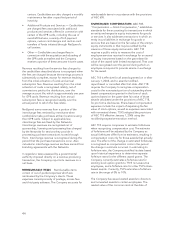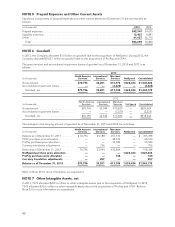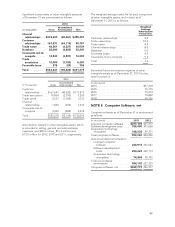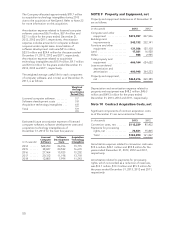NetSpend 2013 Annual Report Download - page 43
Download and view the complete annual report
Please find page 43 of the 2013 NetSpend annual report below. You can navigate through the pages in the report by either clicking on the pages listed below, or by using the keyword search tool below to find specific information within the annual report.incurred, actual contractual penalties inherent in the
Company’s contracts, progress towards milestones
and known processing errors not covered by
insurance.
These accruals are included in other current liabilities
in the accompanying Consolidated Balance Sheets.
Increases and decreases in transaction processing
provisions are charged to cost of services in the
Company’s Consolidated Statements of Income, and
payments or credits for performance penalties and
processing errors are charged against the accrual.
REDEEMABLE NONCONTROLLING
INTEREST: In connection with the acquisition of
CPAY, the Company is party to call and put
arrangements with respect to the membership units
that represent the remaining noncontrolling interest
of CPAY. The call arrangement is exercisable by TSYS
and the put arrangement is exercisable by the seller.
The put arrangement is outside the control of the
Company by requiring the Company to purchase the
seller’s entire equity interest in CPAY at a put price at
fair market value. The put arrangement is recorded
on the balance sheet and is classified as redeemable
noncontrolling interest outside of permanent equity.
NONCONTROLLING INTEREST: Noncontrolling
interest in earnings of subsidiaries represents the
minority shareholders’ share of the net income or loss
of GP Network Corporation (GP Net), TSYS Managed
Services EMEA Ltd. (TSYS Managed Services) and
CPAY. The noncontrolling interest in the
Consolidated Balance Sheet reflects the original
investment by these shareholders in GP Net and
TSYS Managed Services, their proportional share of
the earnings or losses and their proportional share of
net gains or losses resulting from the currency
translation of assets and liabilities of GP Net and
TSYS Managed Services. TSYS has adopted the
accounting policy to recognize gains or losses on
equity transactions of a subsidiary as a capital
transaction.
CARDHOLDERS’ RESERVE: The Company is
exposed to losses due to cardholder fraud, payment
defaults and other forms of cardholder activity as well
as losses due to non-performance of third parties
who receive cardholder funds for transmittal to the
Issuing Banks (banks that issue MasterCard
International or Visa USA, Inc. branded cards to
customers). The Company establishes a reserve for
the losses it estimates will arise from processing
customer transactions, debit card overdrafts,
chargebacks for unauthorized card use and merchant-
related chargebacks due to non-delivery of goods
and services. These reserves are established based
upon historical loss and recovery rates and
cardholder activity for which specific losses can be
identified. The cardholders’ reserve was
approximately $5.8 million as of December 31, 2013.
The Company regularly updates its reserve estimate
as new facts become known and events occur that
may impact the settlement or recovery of losses.
PROVISION FOR MERCHANT LOSSES: The
Company has potential liability for losses resulting
from disputes between a cardholder and a merchant
that arise as a result of, among other things, the
cardholder’s dissatisfaction with merchandise quality
or merchant services. Such disputes may not be
resolved in the merchant’s favor. In these cases, the
transaction is “charged back” to the merchant, which
means the purchase price is refunded to the
customer by the card-issuing bank and charged to
the merchant. If the merchant is unable to fund the
refund, TSYS must do so. TSYS also bears the risk of
reject losses arising from the fact that TSYS collects
fees from its merchants on the first day after the
monthly billing period. If the merchant has gone out
of business during such period, TSYS may be unable
to collect such fees. TSYS maintains cash deposits or
requires the pledge of a letter of credit from certain
merchants, generally those with higher average
transaction size where the card is not present when
the charge is made or the product or service is
delivered after the charge is made, in order to offset
potential contingent liabilities such as chargebacks
and reject losses that would arise if the merchant
went out of business. Most chargeback and reject
losses are charged to cost of services as they are
incurred. However, the Company also maintains a
provision against losses, including major fraud losses,
which are both less predictable and involve larger
amounts. The loss provision was established using
historical loss rates, applied to recent bankcard
processing volume. As of December 31, 2013, the
Company had a loss provision in the amount of
$991,000.
FOREIGN CURRENCY TRANSLATION: The
Company maintains several different foreign
operations whose functional currency is their local
currency. Foreign currency financial statements of the
Company’s Mexican and Chinese equity investments,
the Company’s wholly owned subsidiaries and the
Company’s majority owned subsidiaries, as well as
the Company’s division and branches in the United
Kingdom and China, are translated into U.S. dollars at
current exchange rates, except for revenues, costs
and expenses, and net income which are translated at
the average exchange rates for each reporting
41


